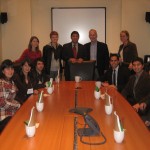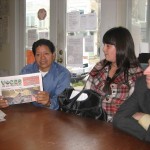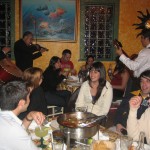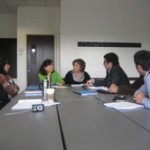Is Health Care a Human Right?
 As Congress enters the final stretch in pushing forward a health care reform bill, I have been struck by the fact that during the ongoing debate very few people seem to pose the question of whether access to health care constitutes a human right. Yet, in many countries around the world, this perspective forms the starting point of their national debates—and this consensus inevitably directs their public policy on universal health care.
As Congress enters the final stretch in pushing forward a health care reform bill, I have been struck by the fact that during the ongoing debate very few people seem to pose the question of whether access to health care constitutes a human right. Yet, in many countries around the world, this perspective forms the starting point of their national debates—and this consensus inevitably directs their public policy on universal health care.
For example, while in Peru I received a grant from the Ford Foundation to conduct research on the right to mental health for survivors of the country’s internal armed conflict. In the course of the study, I interviewed many government officials, advocates from non-governmental organizations and ordinary citizens. None of these people questioned the basic premise of my study which was that health is a human right, as enshrined in international treaties such as the 1966 International Covenant on Economic, Social and Cultural Rights (ICESCR).
Article 12 of the ICESCR provides that “The States Parties to the present Covenant recognize the right of everyone to the enjoyment of the highest attainable standard of physical and mental health.” The Covenant has been ratified by 160 countries in the world, but not the United States. The 1946 Constitution of the World Health Organization (WHO) recognizes that the right to health is a fundamental right “without distinction of race, religion, political belief, economic or social condition.” Significantly, the United Nations General Assembly (composed of representatives from 192 member countries adopted a resolution in 2003 reaffirming the right to health.

 On their last day of the exchange program, October 2, the Chilean students visited an array of legal organizations working in the Milwaukee community.
On their last day of the exchange program, October 2, the Chilean students visited an array of legal organizations working in the Milwaukee community.  In the afternoon the students visited non-governmental agencies working with the Latino community in South Milwaukee. First, they visited Catholic Charities to learn about immigration work and the issues it raises, most notably the hardship faced by families that are often separated due to their immigrant status. Attorney Barb Graham spoke of her tireless work to represent her clients, which frequently requires travelling to Chicago. Afterwards, the students visited Centro Legal where Executive Director Heather Ramirez invited them to cookies and Alterra coffee. The meeting featured staff lawyers Sam Levin and Jason Mishelow speaking about family law; and Mike Blater, criminal law. Board member Mike Balter also offered information about the organization, which offers legal services on a sliding scale. The final stop was at Voces de la Frontera where the members of this association spoke of their grassroots movement to change policy in favor of immigrant and Latino populations, such as laws to allow for valid drivers licenses and fair wages. They explained that their legal work (free clinics on Saturday) complement their activism to help stimulate broader policy change.
In the afternoon the students visited non-governmental agencies working with the Latino community in South Milwaukee. First, they visited Catholic Charities to learn about immigration work and the issues it raises, most notably the hardship faced by families that are often separated due to their immigrant status. Attorney Barb Graham spoke of her tireless work to represent her clients, which frequently requires travelling to Chicago. Afterwards, the students visited Centro Legal where Executive Director Heather Ramirez invited them to cookies and Alterra coffee. The meeting featured staff lawyers Sam Levin and Jason Mishelow speaking about family law; and Mike Blater, criminal law. Board member Mike Balter also offered information about the organization, which offers legal services on a sliding scale. The final stop was at Voces de la Frontera where the members of this association spoke of their grassroots movement to change policy in favor of immigrant and Latino populations, such as laws to allow for valid drivers licenses and fair wages. They explained that their legal work (free clinics on Saturday) complement their activism to help stimulate broader policy change. In the evening the Chilean delegation accepted the gracious invitation to attend the annual dinner of the MULS Hispanic Law Students Association which took place at Club Tres Hermanos in South Milwaukee. The festive event featured Mexican cuisine and conversation in both Spanish and English. The Chileans sang songs along with the Mariachi band and demonstrated Chilean dances. The occasion was a perfect ending to a full week of academic exploration.
In the evening the Chilean delegation accepted the gracious invitation to attend the annual dinner of the MULS Hispanic Law Students Association which took place at Club Tres Hermanos in South Milwaukee. The festive event featured Mexican cuisine and conversation in both Spanish and English. The Chileans sang songs along with the Mariachi band and demonstrated Chilean dances. The occasion was a perfect ending to a full week of academic exploration.